
Gateshead Cinemas 1
A search for Cinema at Gateshead Local Studies brings 139 results
The theatre, music hall and cinema were very popular
pastimes
but now this part of the entertainment industry is a shadow of its
former self;
having been overtaken by television. Music halls were first held
in pubs but shows became too large and separate premises were taken. The first
music hall in Gateshead was the Alexandra at the corner of Oakwellgate Chare and High
Street, opened on 14 November 1870 but closed the following year
after an 'unseemly performance'. The building was later used by the Salvation
Army and the Baptists.
The next music hall was in a large public house on
Bottle Bank and seated 400 people. Known as the People's Music Hall, it had a
short life from 1874-80. The owner of the 'Peoples' was a George Handyside, who
later built the Handyside Arcade in Newcastle. He tried to establish another
hall at Pleasant Row but residents of the area petitioned against his plans and
a theatre licence was withheld. Music halls were socially unacceptable in those
days.
The first theatres in the town were travelling troupes, playing wherever an audience could be gathered, sometimes in Methuen's Long Room on High Street, sometimes at the New Cannon at Low Fell. A temporary theatre was set up in Oakwellgate and put on pantomimes as well as travelling players and works of local playwright Isaac Tucker, a brass founder. Unfortunately, his first dramatic effort in 1845 produced roars of laughter and applause instead of the more genteel appreciation that he had hoped for.
The first permanent theatre was the Queens on High Street. The building had a chequered history as a chapel (1815), music hall, boxing ball, Salvation Army hall (1882), Royal Theatre (1887), the Queens (1891) and the New Hippodrome Cinema (1919)· It was badly damaged by fire in 1922 and a Woolworth store was built on the site. A tragedy occurred in 1891 when seven children were crushed to death during a scramble to escape after a false fire alarm.
The most luxurious theatre in Gateshead was the Metropole, at the corner of High Street and Jackson Street opened on 28 September 1896, by Weldon Watts, former owner of the Oueens. The Metropole had a marble staircase, brass handrails, and a ceiling of elaborate plasterwork. Touring companies provided most of the plays and as these declined in number, the building became the Scala Cinema in 1919 As befitted the splendour of the building, the changeover was carried out in a grand manner. A large orchestra and later a f3,000 organ played music for the silent films.
The first permanent cinema was the Askew, opened in 1909. Moving pictures had been shown by travelling showmen and shopkeepers converted their premises to cash in on what proved to be a profitable sideline. The Askew was in fact one of the latter group and was generally known as 'Horns'. Other early cinemas were the Ravensworth, nicknamed 'the Rats', opened in 1909; Black's Palace (1909)· Empress Electric Theatre ('Loppy Lloyds' 1910) and the Shipcote (1911). 'Loppy Lloyds' was always the cheapest in town. During·the harsh depression years, admission cost 1d, 2d or 3d, while matinees cost three jam-jars, The 1930s saw another spate of new cinemas.
Black's Regal, now the Odeon, was opened by no less a star than Gracie Fields in 1937 and by 1950 there were fifteen cinemas in Gateshead but this was the peak year. Television and bingo were the cause of many closures, although the Essoldo and Ritz were demolished to make way for the Gateshead Highway. Now only two remain, the Odeon and the recently opened Classic which has brought the three in one cinema concept to the town.
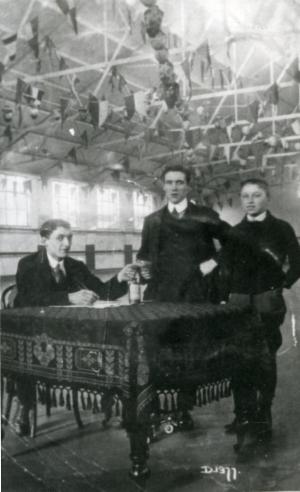
Photographer: Unknown
Date: C1911
iSee Gateshead Photograph Ref: GL004894
Gateshead Cinemas
Item Description: The Apollo, formerly Birtley Hall, was converted from skating rink to cinema in 1912. The building was demolished in 1981 and houses now occupy its site.
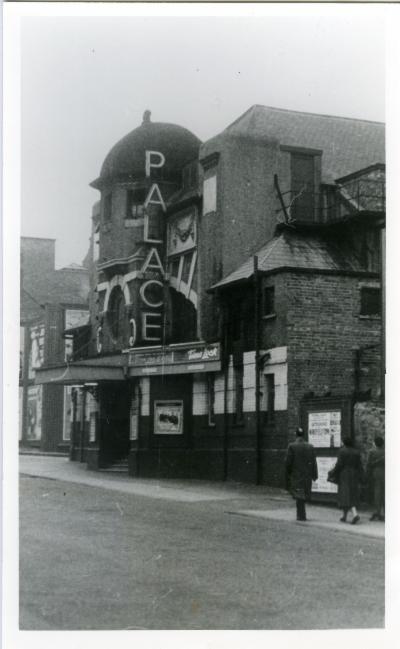
Title: Black's Palace Cinema, Sunderland Road
Photographer: Unknown
Date: Date Unknown
iSee Gateshead Pictures Ref: LS000092
Item Description: "Sunderland Rd
Next to Elders Walker
Known as Little or Dirty Blacks (After the new Blacks Regal was opened on the High St approx 1937.)
Blacks Palace, Sunderland Rd
Arch. Gibson & Stienlet
Opened 27 Dec 1909
Closed 24 Sep 1960"
_________________________________________________________
Advertisement

___________________________________________________________
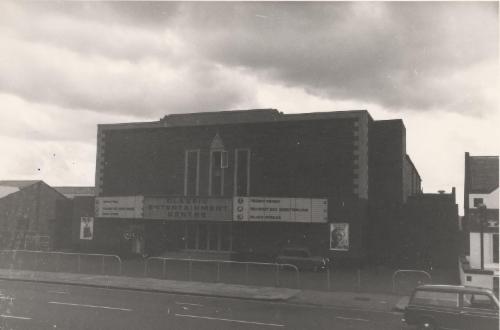
Title: Classic Cinema, Durham Road, Low Fell
Photographer: Manders, Frank
Date: 28/7/1977
iSee Gateshead Old Photographs Ref: GL001191
Item Description: Formerly the Capitol. Not be confused with the Classic on Kells Lane, Low Fell.
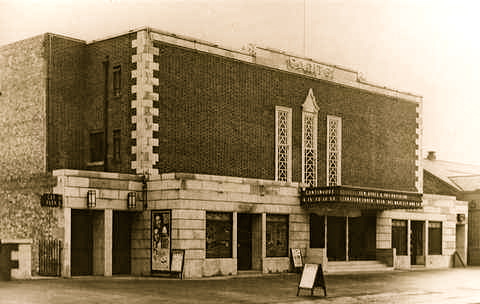
As the Capitol
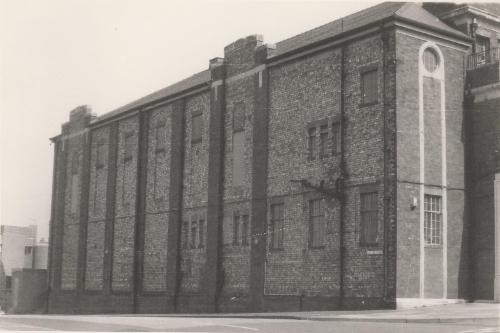
Title: Classic Cinema, Kells Lane, Low Fell
Photographer: Manders, Frank
Date: 28/4/1977
iSee Gateshead History Photographs Ref: GL001190
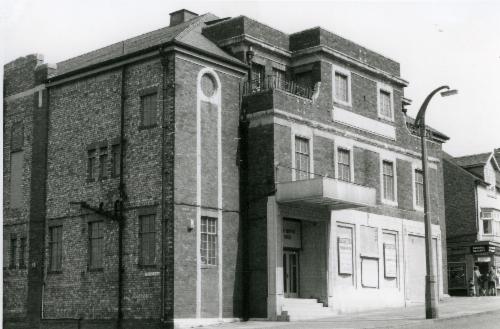
Title: Classic Cinema, Kells Lane, Low Fell
Photographer: Unknown
Date: Date Unknown
iSee Gateshead old Pics Ref: LS000316
Item Description: Image taken looking north east from the junction of Kells Lane and Joicey Road. By the time of the photo, the Classic had been converted into a Bingo Hall.
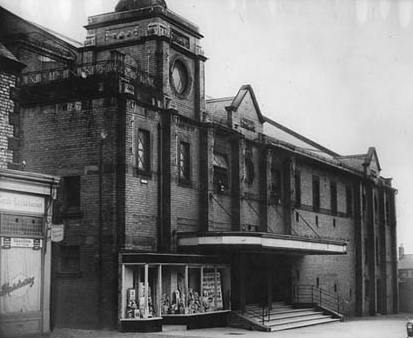
Title: Coatsworth Cinema, Bewick Road, Bensham. 1960
Photographer: Newcastle Chronicle and Journal
Date: June 1960
iSee Gateshead History Photograph Ref: GL007761
Item Description: The Coatsworth opened on 8 December 1913 and was the last cinema to be opened in the borough before the war put an end to cinema building for its duration. Centrally located in the large suburb of Bensham, it was a rival of the Shipcote. With 1343 seats the Coatsworth was Gateshead's second largest pre-war cinema. There was even a boardroom for directors' meetings.
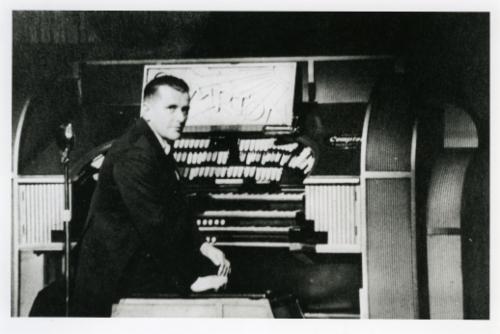
Title: Compton Organ at Black's Regal Cinema
Photographer: Unknown
Date: Date Unknown
iSee Gateshead Nostalgia Photos Ref: LS000025
Item Description: The magnificent Compton Organ at the Black's Regal/ Gateshead Odeon Cinema (possibly its' most striking feature). The organ was on a lift which raised it into view for performances & the console was surrounded by softly-illuminated coloured panels which very slowly changed colour during playing. During WW2 & in the event of an air raid, audiences either left the building or else could stay till the all clear siren. Usually if the raid lasted till after the film ended, an organist used to turn up to play & entertain those who had stayed behind. I believe he was usually the organist from Ven. Bede's churchon Sunderland Road.
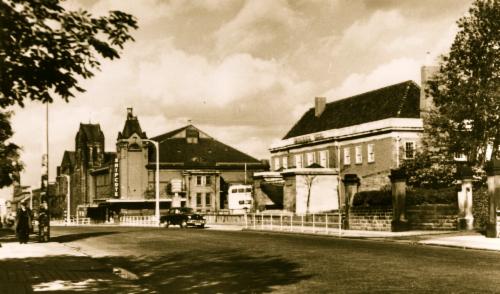
Title: Durham Road, showing St. George's Church, Shipcote Cinema and Springfield Hotel
Photographer: Unknown
Date: C1950
Reference Number: LS000027
Gateshead Cinemas
Item Description: Shipcote Picture Hall opened in 1911 and was the first picture hall in the south of the borough. For many years the Shipcote was famous for the quality of its orchestra which was advertised as the 'Famous Shipcote Orchestra'. During the First World Was there was usually a musical act in addition to the films. In the 1930s the Shipcote was extended to hold over 1200 people and showed its most successful film, Follow the Fleet in 1936. The Shipcote closed on 16 April 1960 with Journey to the Centre of the Earth (Manders, 1973).
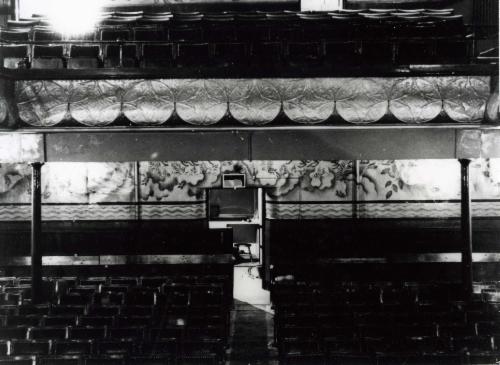
Title: Empress Cinema interior, High Street, Gateshead
Photographer: Unknown
Date: 1956
iSee History Gateshead Ref: GL007763
Item Description: Empress Cinema 1956. High St. This was THE notorious flea pit of G/H. Originally called 'The Electric Theatre' then 'The Empress', but generally known as 'Lloyds', 'Snappy Lloyds' (the film often snapped during showing) but most of all 'Loppy Lloyds' for obvious reasons.
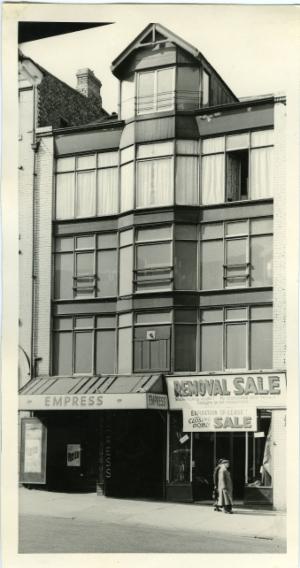
Title: Empress Cinema, High Street, Gateshead 1956
Photographer: Unknown
Date: 1956
iSee Gateshead Pictures Ref: LS000091
Item Description: "High Street. Empress Cinema 130 High St
Known as 'Loppy Lloyds' Photo 1956
Opened 1910 Closed 1956
Demolished 1964"
Duplicate of LS000037
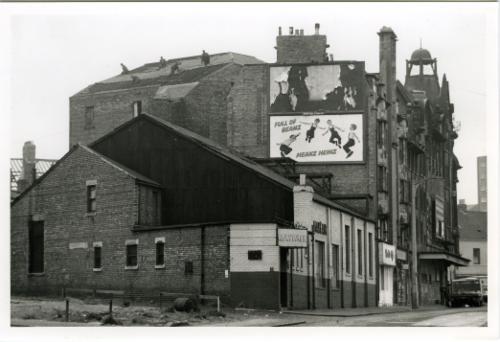
Title: Essoldo Cinema & Mayfair, Sunderland Road, Gateshead
Photographer: Unknown
Date: Date Unknown
iSee Gateshead Pictures Ref: LS000035
Item Description: "The Kings Theatre at junctn of Sunderland Rd & High St. eventually the Empire Theatre & finally the Essoldo Cinema. The Mayfair was a snooker &/or billiard hall."
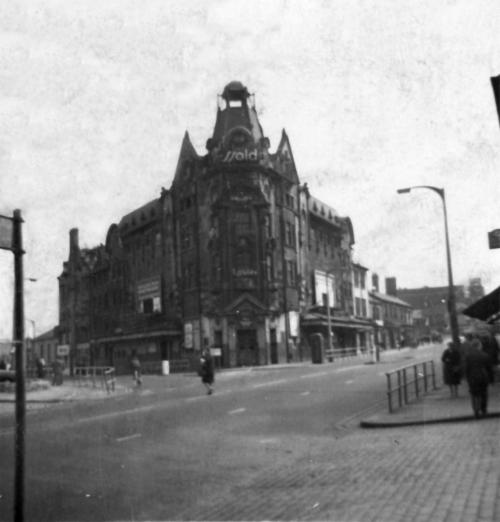
Title: Essoldo Cinema, High Street Gateshead
Photographer: Unknown
Date: C.1950
Reference Number: GL007770
Gateshead Cinemas
This opened as the Kings Theatre in 1905. It was built on a sharp road junction, which resulted in the unusual fan-shaped building. There were 18 rows of seats with a promenade and a saloon lounge over the main entrance. The whole theatre held over 2000 people.
The opening performance was of the musical comedy Floradora. The owners of the theatre intended to run Kings as a ‘high-class’ establishment by either only hiring London theatre companies or those of first class reputation from elsewhere . However, Gateshead was outside the theatre circuit system and the best shows never appeared. The theatre struggled and was eventually converted to a cinema.
The Kings was renamed twice after the First World War becoming the Empire in 1918 and finally the Essoldo in 1950. It closed in 1967 and was demolished in 1968 to make way for the A1 viaduct
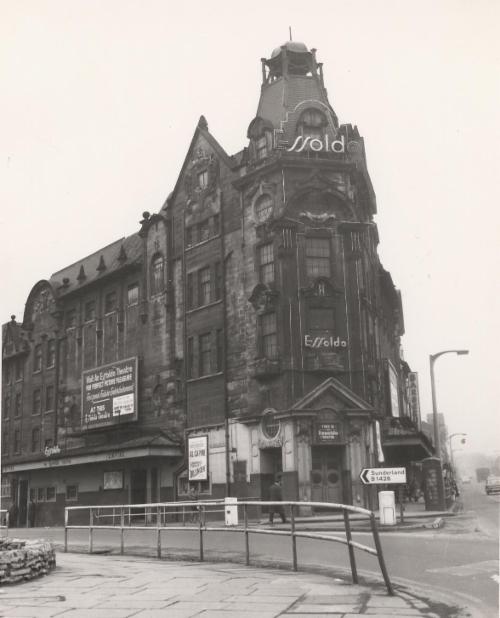
Title: Essoldo Cinema, High Street Gateshead, 1968
Photographer: Davison, N.
Date: February 1968
iSee Gateshead Pictures Ref: GL001189
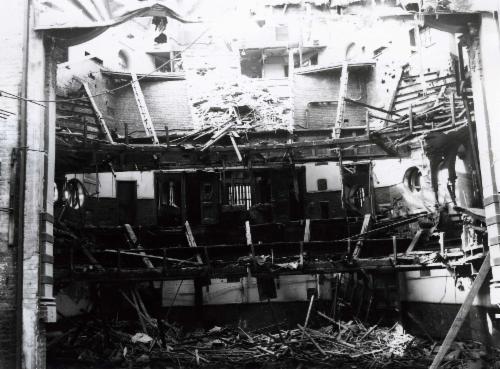
Title: Essoldo Cinema, High Street, Gateshead
Photographer: Davison, N
Date: February 1968
iSee Gateshead Pictures Ref: GL007768
Item Description:
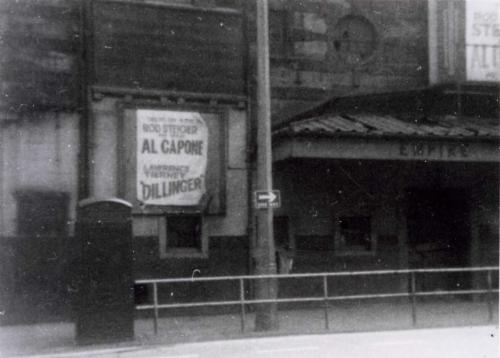
Title: Essoldo Cinema, High Street, Gateshead
Photographer: Unknown
Date: 1968
Reference Number: GL007772
Item Description: The last picture shown at the Essoldo Cinema in December 1967 was a double-bill featuring Al Capone and Dillinger before the building was demolished to make way for the A1 Viaduct.
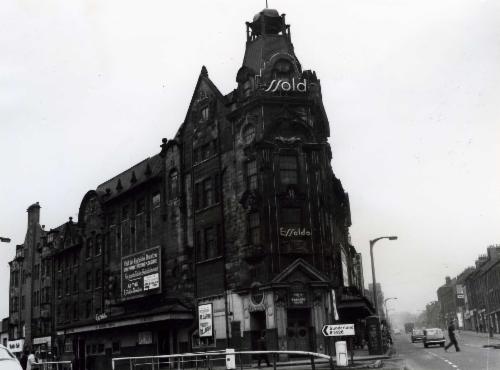
Title: Essoldo Cinema, High Street/Sunderland Road
Photographer: Davison, N.
Date: February 1968
Reference Number: GL007766
Item Description: Shipcote Picture Hall opened in 1911 and was the first picture hall in the south of the borough. For many years the Shipcote was famous for the quality of its orchestra which was advertised as the 'Famous Shipcote Orchestra'. During the First World Was there was usually a musical act in addition to the films. In the 1930s the Shipcote was extended to hold over 1200 people and showed its most successful film, Follow the Fleet in 1936. The Shipcote closed on 16 April 1960 with Journey to the Centre of the Earth (Manders, 1973
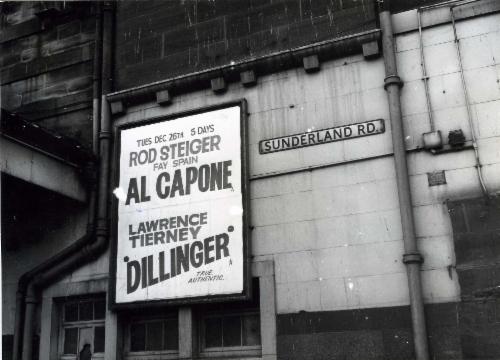
Title: Essoldo Cinema, High Street/Sunderland Road, Gateshead
Photographer: Unknown
Date: C1959
Reference Number: GL007767
The last showing was a double-bill of Al Capone starring Rod Steiger and Dillinger starring Lawrence Tierney. It closed in December 1967 and was demolished to make way for the A1 viaduct. This image was taken in February 1968
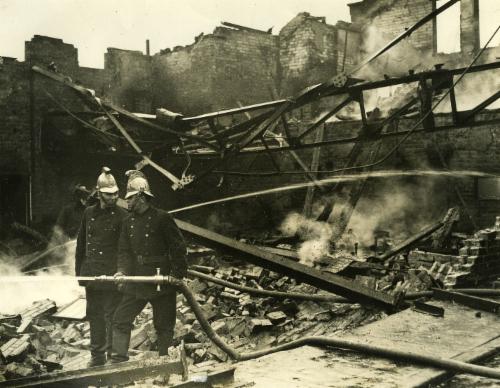
Title: Fire at the Imperia Cinema, Wellington Street, Felling 1929
Photographer: Newcastle Evening World
Date: 01/10/1929
iSee Gateshead Pictures Ref: LS000185
Gateshead Cinemas
Item Description: The Imperia Cinema was built in Victoria Square in 1930 and later the Palais de Danse was added. It is currently a bingo hall. The Imperial was erected in Wellington Street in 1910 and destroyed by fire in 1929. In 1911 the Corona Picture Hall opened in Coldwell Street. This closed in 1960.
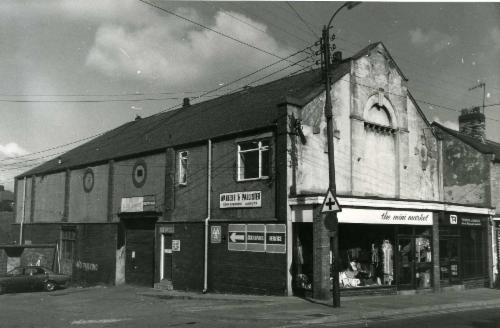
Title: Globe Cinema, Greenside Road, Crawcrook, 1977
Photographer: Manders, F
Date: 27/07/1977
Reference Number: GL009904
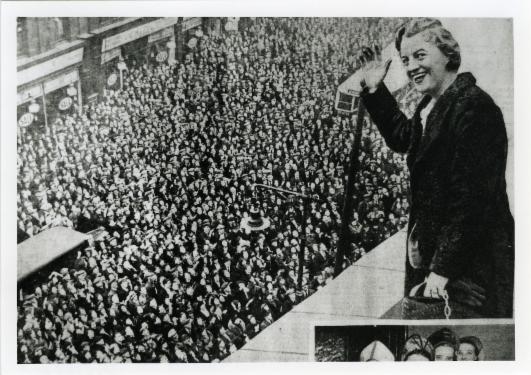
Title: Gracie Fields at the opening of Black's Regal Cinema, Gateshead, 1937
Photographer: Unknown
Date: 05/02/1937
Reference Number: LS000026
Item Description: Opening of Gateshead's, first large circuit cinema, Black's Regal, at junction. of High St & Ann St. Opened 5/2/1937 by Town Mayor. This picture is of Gracie Fields, who attended the opening after interrupting a holiday in St. Moritz to attend. She was at the time a popular singer & the highest paid film star in Britain. Crowds of several thousands stopped traffic in the streets as she sang to them from the roof of the cinema. In 1944 the cinema was taken over by the Odeon chain and in 1945 was renamed Gateshead Odeon. It closed as a cinema on 18/1/1975. This was the most opulent cinema in Gateshead & boasted a magnificent Compton organ (see separate picture)."
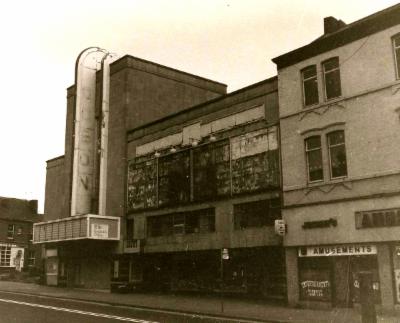
Built in 1936-37, the Odeon, at 306 High Street, was originally known as Black's Regal. The Cinema was officially opened by Mayor Alderman White, in the presence of Gracie Fields in 1937. Crowds of several thousands stopped traffic in the streets as she sang to them from the roof of the cinema (see picture LS000026). In 1944 the cinema was taken over by the Odeon chain, and renamed the Gateshead Odeon in 1945. It closed as a cinema on 18/1/1975. This was the most opulent cinema in Gateshead & boasted a magnificent Compton organ (see picture LS000025 for details).
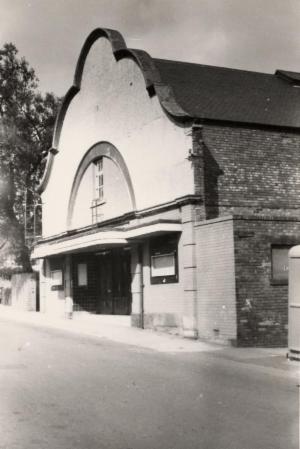
Title: Grand Cinema, Queen Victoria Street, Pelaw, 1977
Photographer: Manders, Frank
Date: 20/07/1977
iSee Gateshead Pictures Ref: GL000686
Gateshead Cinemas
Item Description: The Grand Cinema situated on Queen Victoria Street in Pelaw was built in 1911. This photograph was taken, before closure as a cinema, on 20th July 1977, by local historian Frank Manders. The building remained in use as the ‘Broadway Ballroom’. Classes were run here by instructor Ken Park, a national dancing champion.
Gateshead Cinemas 1 brought to you by
The Felling Heritage Group